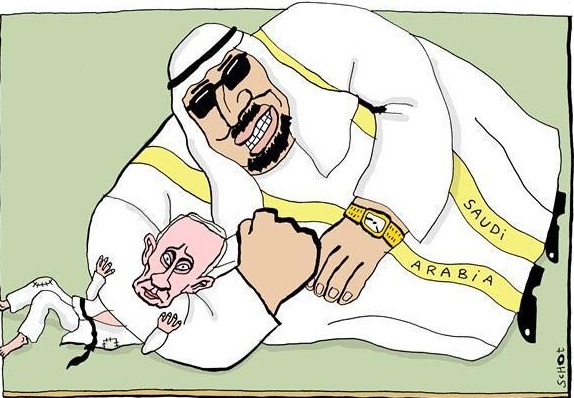Paul J. Saunders writes: While the United States is widely considered Russia’s principal rival in the Middle East, Saudi Arabia may well be taking second place. Moreover, not unlike Moscow’s suspicions toward Washington, Russian officials and analysts have often seen a Saudi hand in problems closer to home, in Russia’s neighboring countries and even within Russia itself. Russian-Saudi tensions thus seem unlikely to lessen anytime soon.
Some of the strains in Russia’s relations with Saudi Arabia derive from the kingdom’s long-standing role as one of America’s closest and strongest allies in the Middle East.
Most interesting is the extent to which senior Russian officials have refrained from publicly criticizing Saudi Arabia and its leaders — they are not nearly so shy in expressing their views of many other US allies. The fact that Putin and Foreign Minister Sergey Lavrov are this careful suggests that notwithstanding widespread negative attitudes toward the kingdom’s foreign policy, Moscow is not eager to provoke Saudi Arabia any more than is necessary. From a certain perspective, that might just be the highest form of respect the Russian government can offer.
Many in Moscow suspect that Saudi Arabia is deliberately depressing oil prices to damage Russia’s economy, either on its own or in collaboration with the United States. The Russian Institute for Strategic Studies, which some see as linked to Russia’s intelligence services, recently published a study making this case. A spokesman for state-owned oil company Rosneft likewise accused Saudi Arabia of “political manipulation” of the oil price. Patrushev has publicly attributed the collapse of the USSR to a similar plot.
Despite deep Russian concerns over Saudi conduct, Moscow clearly views the kingdom with respect as a formidable player. After all, with an economy only one-third the size of Russia’s — and about one-fifth its population — Saudi Arabia has an annual military budget that ranks just behind Russia’s (Moscow’s is the world’s third largest, and Saudi Arabia’s its fourth largest) and is only $8 billion smaller. At the same time, Saudi Arabia’s better-run oil-dependent economy has outperformed Russia’s for most of the last decade, including during the two oil price collapses in 2009 and today.
One mark of this respect was the fact that Prime Minister Dmitry Medvedev attended King Abdullah’s January 2015 funeral. Another is that in each of five different stories about Abdullah’s death, the Russian state media agency ITAR-TASS referred to the late monarch as “King Abdullah, one of the world’s most powerful people.” This is no accident. President Vladimir Putin himself said, “The deceased king was known as a wise and consistent statesman and politician, a leader loved and respected by his people and had a deserved authority on the international scene.”
Indeed, perhaps most interesting is the extent to which senior Russian officials have refrained from publicly criticizing Saudi Arabia and its leaders — they are not nearly so shy in expressing their views of many other US allies. The fact that Putin and Foreign Minister Sergey Lavrov are this careful suggests that notwithstanding widespread negative attitudes toward the kingdom’s foreign policy, Moscow is not eager to provoke Saudi Arabia any more than is necessary. From a certain perspective, that might just be the highest form of respect the Russian government can offer.

